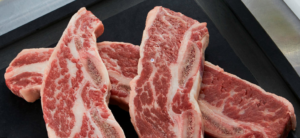Tyson Foods has announced plans to repair its high-volume beef processing plant in Holcomb, Kansas, after a blaze destroyed part of the facility on August 9. As officials are still assessing damage at the site, it is too early to establish a firm timeline for reconstruction and schedule a date for reopening.
Meanwhile all production has stopped, and with the exception of those engaged in debris cleanup, most of the operation’s 3,800 employees are not on the job.
The fire reportedly started at the facility’s box shop. No injuries were reported as a result of the fire, thanks to quick and efficient evacuation of prior to a partial roof collapse occurred.
The plant, which was capable of processing up to 6,000 head of cattle per day when, accounted for more than five percent of total industrial output in the United States and about 20% of Tyson’s capacity, according to JPMorgan analyst Ken Goldman. Steaks, fillets, chops, ribs and other products are distributed to retail stores, foodservice operators and industrial further processors throughout North America and beyond.

“This is a difficult time for our team members and their families, and we want to ensure they’re taken care of,” said Group President Steve Stouffer. “Our full-time, active team members will be paid weekly until production resumes.”
Stouffer said some employees may be soon called on to help with clean-up and other projects, but regardless of the hours worked, all full-time active employees are guaranteed paychecks.
“We’re taking steps to move production to alternative sites,” said Stouffer. “Tyson Foods has built in some redundancy to handle situations like these, and we will use other plants within our network to help keep our supply chain full.”
Alternative Tyson facilities are available for utilization in Amarillo, Texas, and Lexington, Nebraska. According to a Farm/Journal Ag Web report: “The industry anticipates other packers may pick up the slack by adding Saturday shifts, but no announcement has been made. While the industry may hope other plants could pick up the slack, America’s packing industry was already struggling with significant labor shortages, and expanded hours at other plants may prove problematic.”
Tyson Foods operates six plants in Kansas, employing more than 5,600 people. In fiscal year 2018, the company paid $269 million in wages throughout Kansas and estimated its total economic impact, where it ranks among the state’s largest employers, surpasses $2.4 billion in value.
The Springdale, Arkansas-headquartered company’s beef business posted a record operating margin of 6.1% during the first nine months of the current fiscal year, up from 5.8% a year earlier. In the quarter that ended on June 29, the beef unit logged sales of $4.2 billion. It is anticipated that margins will rise to 7% for the full year and be similar or higher in 2020.





